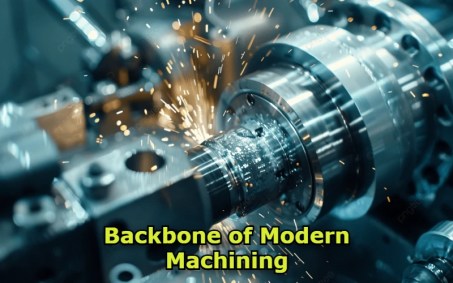Modern Machining: Machining processes have significantly evolved over the years, ushering in advanced technologies and higher efficiency standards. Yet, one aspect remains as critical today as it has always been—filtration.

Effective filtration is the unassuming backbone that ensures the precision, productivity, and longevity of machining equipment. From extending equipment life to improving product quality, filtration is indispensable.
The Role of Filtration in Machining Processes:
Filtration in machining is about more than just removing contaminants; it ensures the entire operation runs seamlessly. During machining, contaminants such as metal shavings, oils, and microscopic particles are produced. Without proper filtration, these elements can wreak havoc on equipment, leading to wear and tear, blockages, and even complete failure.
The filtration process removes debris, ensuring that fluids such as coolants and lubricants remain clean and functional. This is essential for maintaining machining accuracy, as impurities can compromise the quality of finished products and impede efficient operations.
Benefits of Effective Filtration:
Investing in effective filtration systems is not just a precaution; it’s an essential measure with tangible benefits for manufacturers.
1. Enhanced Equipment Longevity:
Over time, contaminants left unchecked can corrode machinery, causing severe damage. Proper filtration minimizes this risk, allowing essential components to function without interruption. By reducing wear and tear, filtration prolongs the life of expensive equipment, which ultimately saves significant replacement costs.
2. Superior Product Quality
Precision machining requires an uncontaminated environment. Impurities in fluids or settling on the surface of components can result in uneven finishes or irregular shaping. Effective filtration ensures these contaminants don’t interfere with the process, leading to higher-quality outputs that meet stringent industry standards.
3. Improved Operational Efficiency:
Blocked or contaminated systems often lead to downtime, which is costly for manufacturers relying on high throughput. With reliable filtration, fluids remain clean and flow smoothly, ensuring uninterrupted operations. This translates to a more efficient machining cycle with fewer delays.
4. Reduced Environmental Impact:
Filtration systems are also an eco-friendly solution in machining. When fluids are properly filtered, they can be reused repeatedly, reducing waste. For example, lubes and coolants can be recirculated efficiently, lowering overall consumption and the associated environmental impact.
Modern Filtration Techniques in Machining:
Today’s industries demand innovative filtration techniques to keep up with advanced machining technologies. Traditional methods may not suffice for the complex needs of modern processes. This has led to the widespread adoption of high-efficiency filtration systems that deliver superior performance.
Filtration Technologies in Use:
Filtration technologies often leverage a combination of physical filters—like a filter plate—and advanced separation methods. These may include centrifugal separation, magnetic filtering, and semi-permeable membranes to trap both coarse and fine contaminants.
Many systems now employ automation, where sensors continuously monitor the state of fluids and prompt filtration mechanisms only when necessary. This approach optimizes energy usage and extends the filter system’s life.
Choosing the Right Filtration System:
Selecting an appropriate filtration system depends on the machining process and the type of materials being used. For heavy-duty applications involving tough metals, a robust system capable of capturing minute particles is essential. On the other hand, lighter operations may require economical filtration solutions focused on removing larger debris.
Understanding the specific operational requirements ensures manufacturers invest in systems that cater to their precise needs.
Challenges in Maintaining Filtration:
While the advantages of filtration are clear, maintaining an efficient system can pose challenges.
Regular System Checks:
Filtration units require regular maintenance to function effectively. Filters can become clogged over time, reducing their effectiveness. Routine inspections ensure the system is operating at peak performance and prevents unexpected breakdowns.
Knowing When to Upgrade:
Over time, older filtration technologies may become obsolete or struggle to keep up with contemporary machining needs. Recognizing when to invest in upgraded systems not only prevents operational inefficiencies but also keeps manufacturers ahead of their competition.
Balancing Costs:
Advanced filtration systems often come with a significant initial investment. However, considering the savings in equipment maintenance, operational downtime, and material costs, their long-term benefits far outweigh the upfront expenses. Striking a balance between the budget and operational needs is key.
Why Filtration Cannot Be Overlooked:
Effective filtration is integral to modern machining processes for all the reasons above. Whether it’s protecting expensive equipment, ensuring the highest quality products, or minimizing environmental impact, filtration influences every aspect of manufacturing.
Neglecting filtration, on the other hand, is a risky choice. It can lead to equipment failures, substantial cost overruns, and compromised product standards.
Recommended: Innovations in Machining Manufacturing
The Way Forward:
The machining industry continues to rely on precision, efficiency, and innovation—qualities that effective filtration directly supports. By understanding the importance of well-maintained filtration systems, manufacturers can position themselves for success in an increasingly competitive market.
From the role of a simple filter plate to the intricacies of high-tech separation systems, every filtration component contributes to the greater goal of flawless machining. Focusing on this backbone isn’t just an operational best practice; it’s a decision that defines success in modern manufacturing.
Tags: Why effective filtration is the backbone of modern machining give, Why effective filtration is the backbone of modern machining qui, Why effective filtration is the backbone of modern machining class, and Explain why effective filtration is the backbone of modern machining.
